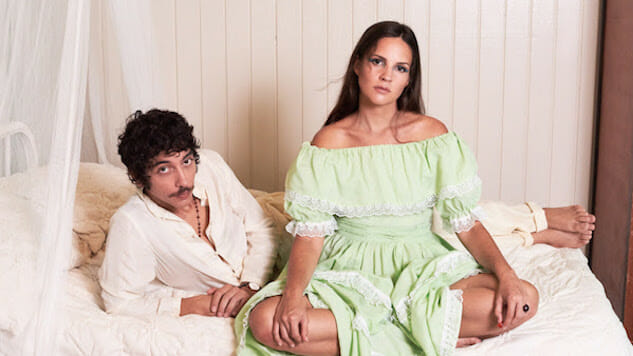Buscabulla: The Best of What’s Next
“What if you sacrifice certain things about your life, because you want your country to be better?”
Image courtesy of the artist
For years, Paste has introduced exciting, up-and-coming artists to our readers. This is the return of The Best of What’s Next, a monthly profile column which highlights new acts with big potential—the artists you’ll want to tell your friends about the minute you first hear their music. Explore them all here.
Two hours away from Puerto Rico’s capital of San Juan, Aguadilla is a haven for both crystalline Caribbean waters and perfect northwest swell surf breaks. Most of the city’s 60,000 people have been there for generations. It’s in stark contrast to the concrete-paved streets and subway commuter hum of Brooklyn, where Buscabulla’s Raquel Berrios and Luis Alfredo Del Valle lived for a decade and began to thrive as artists.
In 2014, the pair released Buscabulla’s debut EP of Latin rhythm-tinged electronic pop music, produced by Blood Orange’s Dev Hynes. They followed up a few years later with EP 2, released on Ribbon Music—a Domino imprint—where Berrios’ vocals shined even brighter over Del Valle’s organic electronica production and which featured a collaboration with their friend Roberto Carlos Lange of Helado Negro. Yet, despite establishing themselves with the surging Brooklyn indie community, the New York grind began to feel increasingly hollow, and they yearned for change. But it was much more than idyllic beachscapes and surf breaks that brought them back home to Puerto Rico.
“There was something deeper calling us,” Berrios tells Paste. “The island had been in a crisis for a while and it’s not the place that it was when Luis and I grew up. It needs good people here, since so many leave for economic opportunities. But there’s also something old school about it, where we have a mission that we owe to our country. Are these feelings antiquated? They are sort of patriotic in a way, but what if you sacrifice certain things about your life, because you want your country to be better?”
Before becoming Buscabulla, Raquel was a DJ who could sing, working at culti-ish NYC Brazilian record store Tropicalia In Furs. Luis Alfredo was an SAE-schooled multi-instrumentalist, producer and audio engineer scouring the city for a musical project that would stick. The pair met, started making music, fell in love and had a daughter.
Now, back in Puerto Rico, the pressure of building the band while working day jobs and raising a child in one of the most expensive cities in the world has eased. Their 2018 move effectively marked their pivot into making music full-time, and on May 8 of this year, they released a debut full-length album in Regresa (Ribbon Music). Written and recorded by Berrios and Del Valle entirely in Puerto Rico (with additional production and mixing by Chairlift’s Patrick Wimberly), it reflects their journey, consciousness and culmination of the music Buscabulla was destined to make.
“This is complete,” Berrios says. “We took all these ideas and the sound we’ve been cultivating and took it a step further.”
-

-

-

-

-

-

-

-

-

-

-

-

-

-

-

-

-

-

-

-

-

-

-

-

-

-

-

-

-

-

-

-

-

-

-

-

-

-

-

-








































